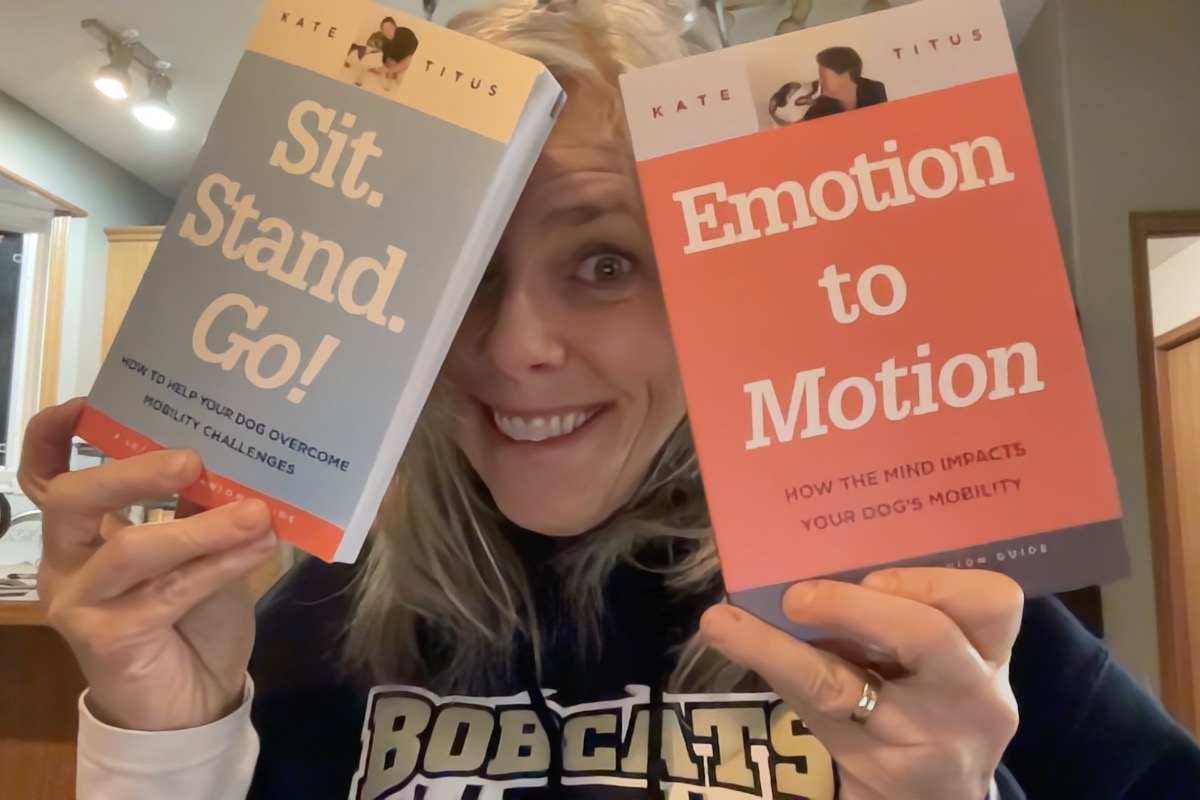Laurie's Blogs.
Dec 2023
Passing Along Tips, Tricks, or a Community That Will Do Just That!

I had quick read through a fantastic new book recently. I was very impressed. Enough so that it inspired my blog for this week.
I’ve been humbled a few times when clients have told me, “oh, I watched a video on YouTube that helped me do ‘xyz’”, or “a dog friend told me about ‘such and such’.” I have to admit, I’ve had times when I felt like I’d let a client down because I assumed that they would just automatically know something that I had taken for granted having learned years before! (i.e. Position your dog’s legs in a normal bent position before asking him to get up to a standing position from a sit. Walk on the grass instead of the sidewalk if your dog is scuffing her feet when she walks.)
Sometimes in an appointment, we are just looking at the ‘here and now’ and we forget to educate about management at home! Home management is critical!
Place a mat at the bottom of the stairs or for turning corners.
How to help a dog go up or down stairs.
How to entice a dog to lie on its side.
The need to raise a food or water bowl.
Putting a contrasting strip of tape on the stairs to help a dog know where to step when his/her vision is failing.
Other times, we don’t think to connect our clients with resources to help them answer questions that they might have that we’ve not even thought about!
New Book
There are some fantastic resources out there. The book that inspired this blog is entitled Emotion to Motion, How the Mind Impacts Your Dog’s Mobility, by Kate Titus. It is filled with exactly that kind of advice and tips that we might forget to give as practitioners! How pain can impact mobility. How providing your dog some independence can improve their mental health and subsequent physical health. How your emotions can play a role in the emotions and well-being of your dog. This book is a fantastic complement to Kate’s first book, Sit. Stand. Go. How to Help Your Dog Overcome Mobility Challenges. I recommend both and you can find them on Amazon!
More Resources
It is wonderful that there are now more and more places for pet owners to go in order to get good advice and/or to join a community. People are doing amazing things to help pet owners navigate through difficult times or diagnoses.
For instance, I wasn’t aware that Kate had a program for pet owners to help guide them through their dog’s challenges:
https://learn.aloyalcompanion.com/bundles/membership
I know of some other Facebook groups that are run by rehab professionals to help address animal owner concerns:
The Living with Dogs with Disabilities is a group run by canine rehab PT/Physio, Sarah MacKeigan
https://www.facebook.com/groups/1467331210138935
Answering questions and building a communities around senior dogs is Shauna Slobodian: https://www.facebook.com/groups/ourhealthyseniordogs as well as Shari Sprague: https://www.facebook.com/groups/910867446880535
Lisa Bedenbaugh, another PT, runs a group about hip dysplasia: https://www.facebook.com/groups/682041205938849
And a large and ever growing web presence belongs to Hanna Capon and her CAM (Canine Arthritis Management) website, Facebook page, etc! https://caninearthritis.co.uk/
Another group that seems well attended to is the one for Laryngeal Paralysis. Not run by a rehab person, but lots of decent advice it would seem: https://www.facebook.com/groups/larpar
Then there are some groups where I have to just turn a blind eye – and IVDD group that promotes crate rest so hard that people post things like, “I’ve been crate resting my dog for 5 months now, when should I expect to see some improvement.” (I want to pull my hair out!)
Or the Conservative for dogs with CCL injuries, where the questions are, “My dog is a high energy 3-year old, and we want to avoid surgery for a fully tear of his cruciate.” (I scroll by, instead of saying, just do the surgery already!)
Conclusion:
BUT, the point of this blog is that owners are seeking MORE information. They are hungry for opinions, experiences, and sometimes advice. They are looking for tips and tricks and often seeking encouragement! So, why not check out some of these groups and then direct your owners to some positive resources to help them cope with what’s going on with their dog.


